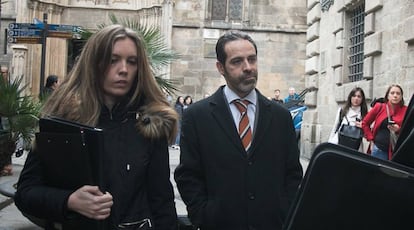30 officials to face trial in Barcelona over role in independence referendum
Investigating judge considers these people played “a decisive” role in organizing the vote, setting a global bond of €5.8m for 17 of them. Sedition charges have been dropped, however


While Spain’s Supreme Court continues its trial of Catalan separatist leaders in Madrid, another major judicial investigation into the 2017 independence drive is coming to an end.
Judge Alejandra Gil of a Barcelona court has ended her preliminary probe into the unauthorized referendum of October 1, 2017, and has charged 30 people with offenses ranging from the misuse of public funds and disobedience, to the disclosure of secrets. Another 15 people under investigation will not be prosecuted.
The judge has dropped the sedition charge that her predecessor at the helm of the investigation had been considering
Most of these individuals were on the “second line” in the government of Carles Puigdemont, the former Catalan premier under whom the referendum took place, and who fled Spain to avoid arrest soon after separatist parties passed a unilateral independence declaration in the regional parliament.
The investigating judge considers that they played “a decisive” role in organizing the referendum, and has set a global bond of €5.8 million for 17 of them, on the basis that this is the amount of money that was “allegedly spent or tied up to hold the referendum.”
According to the investigation, all these people were aware of “the illegal nature of the actions” required to organize the referendum, yet “followed the guidelines” set by various Catalan departments with the goal of holding the unauthorized vote. Each of the 30 individuals, “within his or her scope, contributed decisively” in making the referendum a reality.
No sedition
But Judge Gil has dropped the sedition charge that her predecessor at the helm of the investigation, Juan Antonio Ramírez Sunyer, had been considering against some of the targets of the probe. Sunyer passed away in November, and defense lawyers for top separatist leaders who are being tried at the Supreme Court have complained that this latter tribunal’s investigation was largely based on Sunyer’s own preliminary work.

Among those who have been cleared of all charges are Carles Viver Pi i Sunyer, considered the “legal architect” of the independence bid, and Santiago Vidal, a former judge and former senator for the Catalan Republican Left (ERC). The investigation was originally triggered by public statements made by Vidal to the effect that the Catalan government was engaging in illegal acts to organize the referendum.
Violence
It was this investigation that led to a court order to search the Catalan department of economic affairs on September 20, 2017. This is a key date in the timeline because the police raid triggered a response by pro-independence activists, who congregated in large numbers outside the building and vandalized patrol cars. A court official sent to oversee the police raid has told the Supreme Court that she feared for her own safety and asked to be escorted out using an alternative exit. This has become a cornerstone of the rebellion charges against top independence leaders, as the charge requires proving the existence of violence.
The 30 people who will face trial worked as top aides to the consellers, or regional department chiefs. There are four secretary generals and two director generals, none of whom enjoy the aforado status that would have made them immune to action from the lower courts, as opposed to regional department chiefs. A former secretary who was in charge of the promotional campaigns for the referendum, Antoni Molons, has also been formally charged.
English version by Susana Urra.
Tu suscripción se está usando en otro dispositivo
¿Quieres añadir otro usuario a tu suscripción?
Si continúas leyendo en este dispositivo, no se podrá leer en el otro.
FlechaTu suscripción se está usando en otro dispositivo y solo puedes acceder a EL PAÍS desde un dispositivo a la vez.
Si quieres compartir tu cuenta, cambia tu suscripción a la modalidad Premium, así podrás añadir otro usuario. Cada uno accederá con su propia cuenta de email, lo que os permitirá personalizar vuestra experiencia en EL PAÍS.
¿Tienes una suscripción de empresa? Accede aquí para contratar más cuentas.
En el caso de no saber quién está usando tu cuenta, te recomendamos cambiar tu contraseña aquí.
Si decides continuar compartiendo tu cuenta, este mensaje se mostrará en tu dispositivo y en el de la otra persona que está usando tu cuenta de forma indefinida, afectando a tu experiencia de lectura. Puedes consultar aquí los términos y condiciones de la suscripción digital.








































